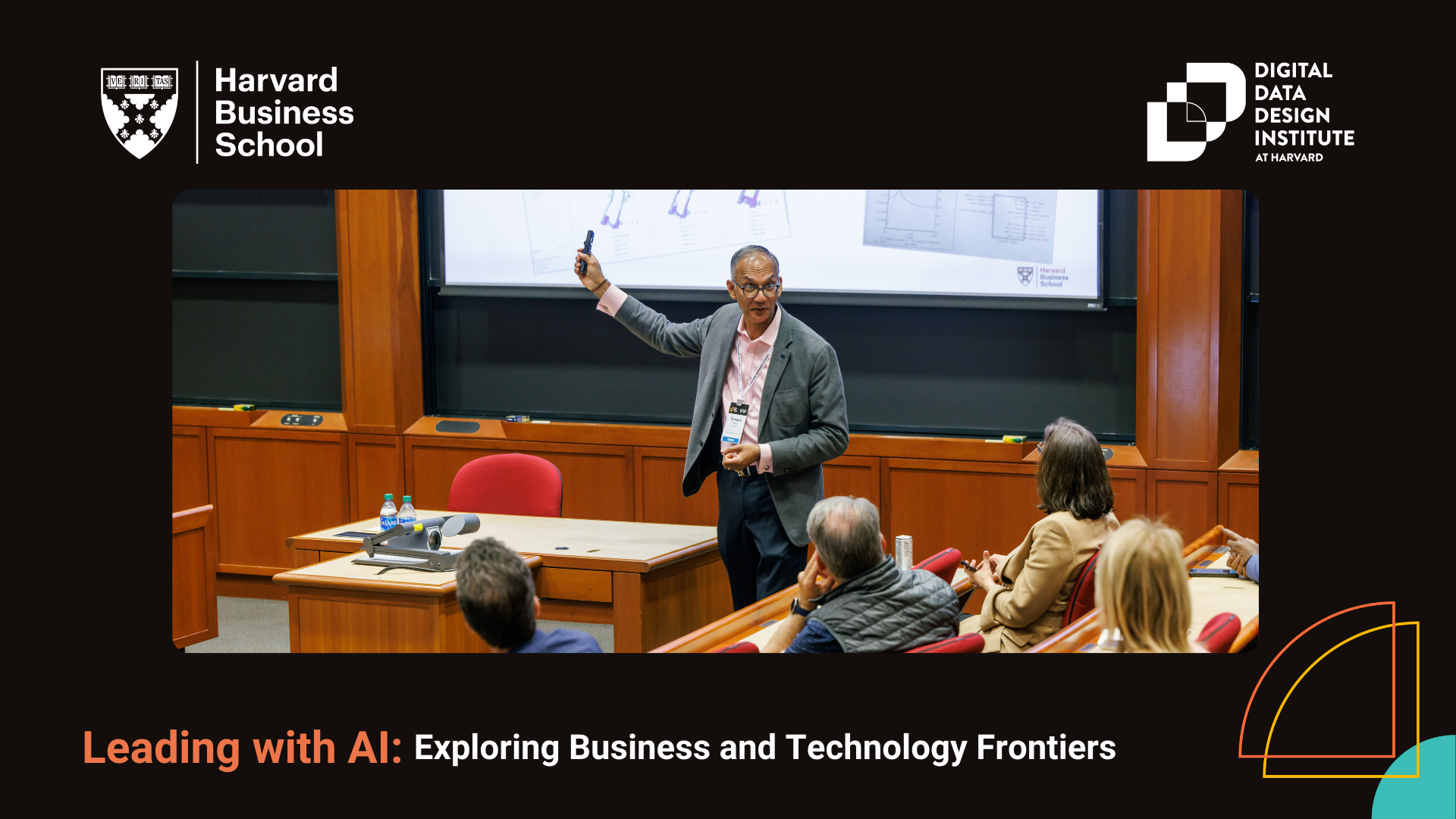On May 7, the Digital Data Design Institute at Harvard hosted Leading with AI: Exploring Business and Technology Frontiers. The conference featured breakout sessions where HBS staff and industry experts discussed specific and specialized topics. Sunand Menon, an Executive Fellow at HBS, led an interactive breakout session discussing data collected by the HBS Leadership Initiative on what it means to lead in a digital world. The study, which collected data from over 6,800 senior executives in 100+ countries, highlighted the most important leadership characteristics and capabilities required to thrive in the era of AI.
Key Insight: Continuous Reinvention and Adaptability
“Today’s leaders really have to have a different mindset. It’s really about mindset and behavior change, and that’s really around continuously learning, continuously adapting, and staying curious.”
Sunand Menon
The session on “Leadership in an AI-Enabled World” highlights the critical need for continuous reinvention and adaptability in modern leadership. The “Leading in the Digital Era” Harvard Business School Executive Education program taught by the speaker exemplifies this by constantly updating its curriculum to reflect the rapid evolution of technologies like AI. This ensures that leaders are equipped with the latest knowledge and skills. The program’s dual focus on teaching and ongoing research allows it to stay ahead of the curve, understanding and addressing the ever-changing leadership implications. Additionally, maintaining the right data and infrastructure is essential for leveraging new technologies effectively, requiring continuous upgrades and adaptation. Ultimately, leaders must foster a culture of openness to change, encouraging innovation and continuous learning, while being receptive to new ideas and feedback from all organizational levels. This approach ensures they remain effective and competitive in a rapidly evolving technological landscape.
Key Insight: Balancing Data-Driven and Data-Informed Decision-Making
“Data-driven is the data telling us we need to do this, let’s do this. Marketing analytics is a great example of that, right? Data-informed, on the other hand, [has] an element of human interaction there… there’s constant checking and iterations that go on with it.”
Sunand Menon
The session emphasizes the critical distinction between data-driven and data-informed decision making, highlighting the importance of balancing the two in effective leadership. Data-driven decision making relies heavily on quantitative analysis, guiding actions based on trends and patterns, which is essential for optimizing outcomes in fields like marketing analytics. However, the limitations of a purely data-driven approach become evident in complex situations where human judgment and contextual understanding are crucial. Data-informed decision making integrates human insights and contextual knowledge with data analysis, ensuring decisions consider factors that data alone might not capture, such as cultural nuances, ethical considerations, operational experience and long-term strategic goals.
Leaders must foster a culture that values both rigorous data analysis and human expertise. This involves using data as a tool to inform decisions while also encouraging collaboration and dialogue to incorporate diverse perspectives. By balancing data-driven and data-informed approaches, organizations can achieve a more holistic decision-making process, leveraging the strengths of both quantitative data and qualitative insights. This balanced approach enables leaders to make well-rounded, efficient, and strategically sound decisions, adaptable to changing circumstances.
Key Insight: Strategic Partnerships and Reverse Mentoring
“You really have to be prepared for that journey because it’s a lot of hard work to bring everyone in the organization along with you to be able to do this right. You need to be able to upskill that talent, you need to be able to bring in new digital natives who are going to help reverse mentor you and also take you forward and show you all the new possibilities that are out there.”
Sunand Menon
The session highlights the crucial role of strategic partnerships and reverse mentoring in navigating AI implementation and digital transformation. Strategic partnerships enable organizations to bridge internal competency gaps by leveraging external expertise and technologies, accelerating innovation, and staying competitive. By partnering with external experts and organizations closer to the end-user, companies can access new skills and insights essential for thriving in a rapidly evolving technological landscape.
Reverse mentoring, where younger, tech-savvy employees mentor senior executives, facilitates a two-way knowledge transfer that keeps leadership updated on the latest technological trends while imparting strategic decision-making skills to the younger workforce. This approach fosters a culture of continuous learning and collaboration, breaking down hierarchical barriers and integrating diverse perspectives into decision-making processes. Together, strategic partnerships and reverse mentoring enhance an organization’s adaptability and innovation capabilities, ensuring they can effectively navigate digital transformation and remain agile in a competitive environment.
Why it Matters
- Businesses should invest in ongoing training and development programs for their leaders and employees. Encouraging a culture of continuous learning and flexibility will help organizations stay ahead in the rapidly changing technological landscape.
- Companies should develop frameworks that integrate both data analytics and human insights. By doing so, they can make more comprehensive decisions that account for quantitative data and qualitative factors.
- Businesses should actively seek strategic partnerships to enhance their technological capabilities. Additionally, implementing reverse mentoring programs can help bridge the digital knowledge gap between different generations within the organization, fostering a more innovative and adaptive culture.
Meet the Speaker

Sunand Menon is a digital strategy thought leader with 25 years of expertise in transforming traditional businesses and creating and leading new digital and analytics-enabled businesses. He is widely published within the business press on digital strategy, operations and leadership including the Harvard Business Review and Fast Company.
As an Executive Fellow at the Harvard Business School, he co-created and co-teaches the “Leading in the Digital Era” Executive Education program. He is part of the HBS Leadership Initiative where he focuses on designing and running interactive learning programs to better prepare leaders for the complexity and speed of the digital era and to instill the right mindsets and behaviors to thrive in the current business world.
Additional Resources
- New Media Insight: New Media Insight is a digital transformation advisory firm founded by Sunand that helps C-Suite to create new data, analytics and artificial intelligence-based businesses, digitally transform traditional businesses, and develop digitally mature and innovation-based organizations.
- Where Can Digital Transformation Take You? Insights from 1,700 Leaders: Want to learn more about the qualities that set digitally mature organizations apart? Read this article written by Menon and his colleagues discussing insights from numerous business leaders.
